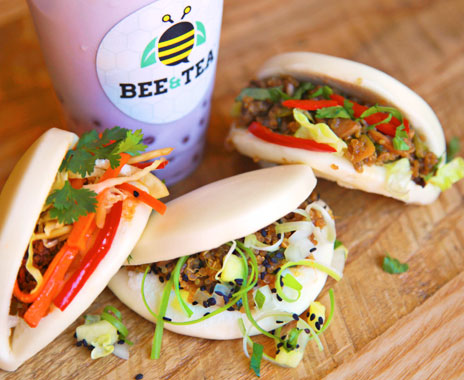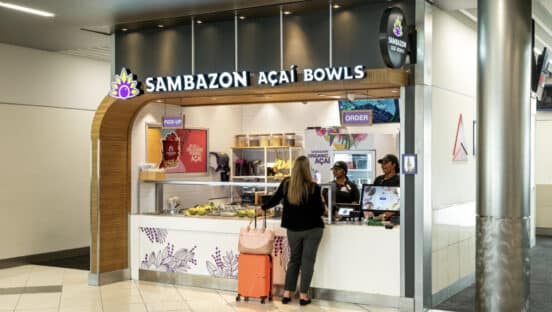With speculation swirling that the frozen-yogurt market might be nearing a saturation point, fro-yo operators are working hard to diversify their concepts for long-term sustainability.
Some brands are building out their product lineup, making room on their menus for items like smoothies, coffee, juice, and a range of food offerings. Other brands, meanwhile, are squeezing into smaller footprints or repurposing existing stores as new concepts.
At Oklahoma City–based Orange Leaf, executives had found that customers wanted to preserve the self-serve experience, leading the brand to add self-serve smoothies to the mix. Carrie Pemberton, director of franchisee relations at Orange Leaf, says the product seemed like a natural brand extension.
The relatively small addition went through a few iterations before the brand got it right, however. Orange Leaf’s R&D team tested traditional smoothie recipes with ice machines, blenders, and new ingredients, but found the labor-intensive process took the focus away from the brand’s do-it-yourself spirit, Pemberton says.
“We have great self-serve machines from Stoelting, so we partnered with them to get the right product mix and the right temperature to create a self-serve smoothie from the same machines we use for frozen yogurt,” she says. The brand launched three smoothie flavors in early July, and initial impressions look good. “People are having fun; they get smoothies in the same amount of time that their friends get frozen yogurt, and they are interacting with the brand in the same way they always have.”
Meanwhile, Orange Leaf is still expanding across the country, with 50 stores under construction. Pemberton sees smaller store footprints, nontraditional storefronts, and kiosks as additional opportunities to keep growing the brand.
Other frozen-yogurt players have tried a range of tactics. Red Mango introduced its Red Mango Yogurt Café & Juice Bar concept, which serves fruit and vegetable smoothies, sandwiches, and salads. Pinkberry introduced its new Pick-Up Packs, which are insolated carriers that carry six to 24 yogurts and connect the brand with catering opportunities.
Mandy Calara, founder of Chicago-based chain Forever Yogurt, is repurposing two of his underperforming Lincoln Park fro-yo shops into a new concept called Bee & Tea, which will offer Taiwanese boba milk tea and baos, which are steamed buns filled with savory and sweet fillings. Frozen-yogurt machines will be used for yogurt smoothies and desserts, with Asian flavors like taro, lychee, and matcha.
Calara has big plans for the repurposing program. He is offering the rebrand as a franchise opportunity and sees the plan as especially attractive to smaller frozen-yogurt chains and independents, which are even more vulnerable to overexposure. “Each city has its frozen-yogurt leader, and in many markets, they may be reaching a saturation point,” he says.
With fresh paint, some reclaimed wood, and a willingness to take on relatively easy food preparation, a fro-yo shop can be transformed, Calara says. Stores don’t have to add ventilation hoods. The food is prepared using heat and steam only, and the menu cross-utilizes as many ingredients as possible, with lots of fresh fruit and vegetables.
By Calara’s estimation and research, bubble tea and baos work well in similar areas and among a similar demographic as frozen yogurt. In addition, his business model will round out more dayparts. “Frozen yogurt is largely an evening and weekend business, and bubble tea matches up with that, while baos will build into lunchtime,” he says.
Justin Massa, CEO of market intelligence provider Food Genius, sees this diversification from the frozen-yogurt industry as a promising direction for the future. “We may have hit a peak in stand-alone fro-yo locations,” Massa says.
In fact, frozen-yogurt brands’ success has even inspired more traditional operators to test it on their menus, making fro-yo operators’ need to diversify all the more urgent.
“For operators, this is a relatively easy item to add to the menu and has the potential to drive higher margins than other more expensive dessert options,” he says.
To eliminate the risk associated with opening a stand-alone fro-yo shop, Melissa Nelson and Jeremy O’Sullivan developed a new concept that focuses instead on shrinking the footprint of the store. The two are co-creators of Frobot, an ATM-like machine that dispenses frozen yogurt with the swipe of a credit card. After testing in the Washington, D.C., area and further developing the prototype, the two are optimistic about their prospects and plan to launch 50–100 Frobots in 2015.
“I think frozen yogurt as a trendy destination thing to do is being oversold, but we believe that the product is just emerging as a staple, and that’s the real potential,” O’Sullivan says.
Frobot machines removes all overhead and offer convenience, accessibility, and a much more affordable price point ($3) than traditional frozen-yogurt shops, where toppings and extras can often bump the price to more than $7 per treat. Frobot’s business plan also accounts for repeat visits, with a rotating roster of 12 flavors being featured one or two flavors at a time.
“You may walk by a Frobot and not see you favorite,” O’Sullivan says. “You might try what’s there, or check back another day. Either way, there’s an element of surprise that supports the simplicity of our plan, both in terms of the technology and the product.”







